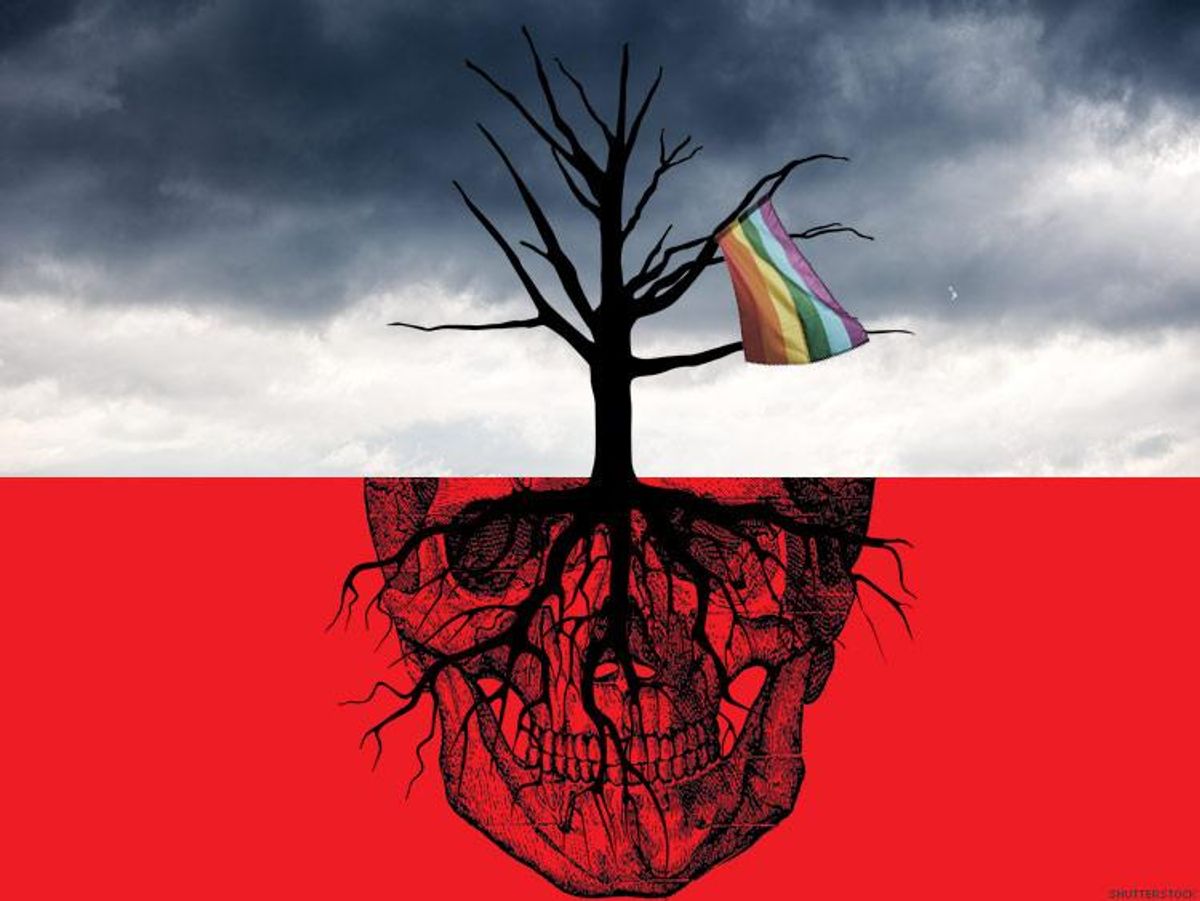Confused by the mixed motives of the Orlando mass murderer? Don't be: Institutional homophobia leads to internalized homophobia. After all, they share the same root. Homophobic institutions -- family, education, religion, government -- lead to internalized homophobia. To reorient homophobia as a problem of geography (Middle East) or religion (Muslims) is to look only at a single branch and not the root, which is both above ground and underground, both local and global, both domestic and foreign, both here and there. To reorient homophobia as a problem of identity is to burn the tree with fuel and fire. Yes, it may burn the tree, but how far will the fire spread and what remains on scorched earth? To reorient homophobia as a problem of politics is to poison the tree with acid. Yes, it may kill the trunk, the branches, the leaves, but when poison reaches the root, it also reaches the ground. To reorient homophobia as simply a problem of history is to leave the root in the ground.
"Do you remember your President Nixon?" As David Bowie rightly insinuated in "Young Americans," no nation exhibits such historical amnesia as the U.S., and he might've added that no city displays such memory loss, short-term and long-term, as Los Angeles. Like an after-hours partygoer rolling on Molly, all that counts and all that beats is right now right now right now. The city is well-known for bulldozing old buildings to make way for new construction, for razing old homes to expand freeways, and for training its Hollywood spotlight on the young, the fresh, the new. Yet the city is less well-known for another kind of razing: erasure of its LGBT past. Though a plaque marks the Black Cat in Silver Lake as the site of the "first documented LGBT civil rights demonstration in the nation" in 1967, the Black Cat is no longer an LGBT bar, and the plaque erases the trans-led rebellion at Cooper's Donuts in downtown L.A. in 1959. No plaque marks that site, though L.A. Latino author John Rechy wrote of the rebellion in fiction (City of Night) and nonfiction (Sexual Outlaw). Before Cooper's, in 1950, Harry Hay and other gay men convened in L.A. to found the Mattachine Society, the first viable national LGBT civil rights organization. In 1952, ONE issued the first national LGBT publication. The Advocate began publishing in 1967; both were founded in L.A. In 1970, L.A. staged one of the first three simultaneous Pride parades in the nation.
Clearly, the city has plenty to be proud of with its LGBT past, so why not cheer more loudly? Why not commemorate and celebrate this civil rights activism at every chance? Perhaps because the past is also where we bury the darker side of the truth, where we hide our ugly, and often unrecorded, history. During those pre-Stonewall decades in L.A., gays, lesbians, bi and trans people were frequently persecuted and arrested under Rule No. 9 for "cross-dressing," while vagrancy, oral copulation, and sodomy laws were ruthlessly enforced, causing scores of cruising men to be harassed, entrapped, and arrested in Pershing Square and MacArthur Park. Even Bayard Rustin, Freedom Rider and African-American civil rights leader, was sentenced to L.A. County jail for 60 days in 1953 on charges of "sex perversion."
When I teach L.A. in Transit, a queer studies course centered on the history of LGBTQI activism in the city, few students can name more than one of these events or figures. How can I blame them for not remembering when the city itself erases so much of its past? In order to be remembered, events must first be recorded and recounted. To deny, ignore, or forget a past is to deny dignity to an entire group of people. Even the recent past is not well known. Before Orlando, anti-LGBT violence was on the rise nationally, spiking after the repeal of "don't ask, don't tell" in 2011 and the fall of the Defense of Marriage Act in 2013. After civil rights progress, other subordinated groups have experienced backlash too, including African-Americans and women. Perhaps this violent backlash could be expected, but should it be accepted? And should it be straightwashed out of history, with newspapers, politicians, and preachers calling the Orlando mass murder an attack on "Americans" or "human beings," as if the murderer was not American-born and had not targeted an LGBT nightclub? And, most especially, targeted LGBT Latinos? On the same day as the Orlando shooting, an Indiana man was arrested in Southern California on his way to L.A. Pride, with an arsenal of assault rifles and explosives in his car. Regardless of his intentions, he was headed to an LGBT festival, not a NASCAR rally. It appears we were in his sights.
When the summer of 2016 is recounted, our stories shouldn't be told only by LGBT people; they should be remembered and recounted by an entire nation. All of us must write over straightwashed trees with loud purple colors. We must retell history not only because the old version is incorrect but also because it is incomplete. In order to pull out the root of institutional homophobia, we'll need a powerful tool: a living history. Let's remember our President Nixon -- and Roy Cohn, the internalized homophobe who advised him. Let's write new stories, stage new shows, make new art out of the past, so that we may make new laws, teach new lessons, and have new faith in the future. And let's orient our history where it belongs: in us, in our cities, in our nation, and in our time.
 MARTIN POUSSON is the author of Black Sheep Boy and professor of creative writing and queer studies at California State University, Northridge.
MARTIN POUSSON is the author of Black Sheep Boy and professor of creative writing and queer studies at California State University, Northridge.
































 MARTIN POUSSON is the author of
MARTIN POUSSON is the author of 

















































Fans thirsting over Chris Colfer's sexy new muscles for Coachella